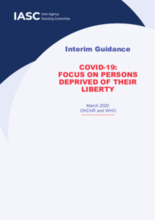COVID-19 has been declared a global pandemic and as it is spreading, identified vulnerabilities such as the situation of persons deprived of their liberty in prisons, administrative detention centres, immigration detention centres and drug rehabilitation centres, require a specific focus.
Persons deprived of their liberty face higher vulnerabilities as the spread of the virus can expand rapidly due to the usually high concentration of persons deprived of their liberty in confined spaces and to the restricted access to hygiene and health care in some contexts. International standards highlight that states should ensure that persons in detention have access to the same standard of health care as is available in the community, and that this applies to all persons regardless of citizenship, nationality or migration status.
Maintaining health in detention centres is in the interest of the persons deprived of their liberty as well as of the staff of the facility and the community. The state has the obligation, according to international human rights law1 , to ensure the health care of people in places of detention. If the risks related to the virus in places of detention are not addressed, the outbreak can also widen spread to the general public.
The series of messages in this guidance aim at addressing the specific issues of persons deprived of their liberty - including children - with the responsible services and ministries (Ministry of Justice/Ministry of Interior/Ministry of Health/Agencies in charge of migration, asylum and rehabilitation centres, etc.).
A few selections from the guidance regarding the detention of children include:
- "In the case of children, authorities have the responsibility to ensure that the best interests of each individual child is the primary consideration and it is widely argued that detention even as a last resort, is never in the best interests of a child, especially when referring to child immigration detention. Thus, non-custodial alternatives to detention, which are family based or community based, should be favored for any person under 18 years, especially in the context of COVID-19 decongestion measures and increased risks to the right to life of all detainees and personnel."
- "Particular efforts should be made to ensure family visits and alternatives are provided to all detained children and other vulnerable persons in detention, including person with disabilities who may not otherwise be able to maintain contact through other means with their families."
- "For those who may not have a residence upon release, the state should take measures to provide adequate housing and reasonable accomodation, which may require the implementation of extraordinary measures as appropriate in a state of emergency, including using vacant and abandoned units and available short-term rentals. In the case of unaccompanied children, special measures to safeguard their care and protection must be under-taken."

